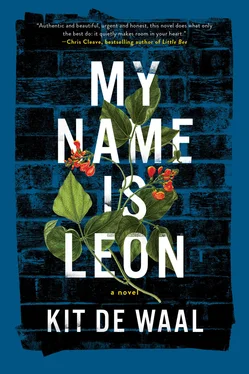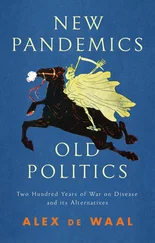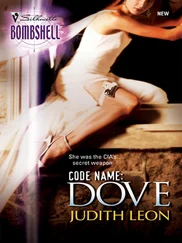He throws the blanket off and sits up.
“Too hot?” asks Sylvia.
“Can I go back to bed, please?”
As soon as he is in his room, he gets his red backpack from his cupboard and puts it on his lap. He looks inside and counts his things. He opens the pockets with the zippers and looks inside at all the things he’s collected and then he puts it next to the bed. The full feeling in his chest has gone. He gets back into bed and closes his eyes and sees his mother’s back, sees her jeans and her cardigan and her sneakers disappearing down the corridor at the Family Center. And he doesn’t see her turn around and wave, because she didn’t.
In the morning, he’s better andhe’s starving. Sylvia puts her hand on his forehead as he eats four Weetabix with sugar sprinkled on top.
“Better stay off school for one more day. All right?”
Leon runs to his room and gets dressed. He takes his backpack and goes back to the kitchen.
“Can I go out on my bike, please?”
Sylvia looks at him with one eyebrow higher than the other.
“How do you feel? It’s hot out there, you know? Go on, but half an hour tops. All right? How long did I say, Leon?”
“Can I have two hours, please?”
“No, you get back here for lunchtime. It’s ten thirty now. That’s an hour and a half. Go on.”
There is hardly anyone at the allotments. No Mr. Devlin. No Tufty. Only a few old men in distant plots and Mr. and Mrs. Atwal sitting on chairs by their shed. Leon waves as he cycles past. He rides through the allotments, past Mr. Devlin’s plot, past Tufty’s plot and past five other plots, to the edge of the allotment where there are scruffy bits of land that no one wants, where tall, forgotten plants sprout seeds and prickly leaves, coarse and sharp, where there are gnarled trees and overgrown paths. And an old shed.
Leon parks his bike at the back of the shed and tries to open the door. It’s made of heavy planks of wood nailed together. He has to pull it hard with both hands and when he steps inside it bangs behind him, clashing against the corrugated iron roof that shudders and moans. A heavy lump of light comes in through a broken pane of glass but the other window is covered in a veil of dust. No one can see him but people might have heard the door. He peeks out. Nothing. Ropes of curling plants stick to the walls; spiders’ webs, thick as cotton wool, nest in the corners and hang between the wooden struts that hold up the roof. There are dead moths and butterflies caught in white sticky traps. The whole place smells of hot soil and dry wood, not like Tufty’s shed. There are plastic plant trays upturned on the floor, a metal chair on its side, and a crooked wooden table leaning against the wall, its legs splintered and uneven. Nobody looks after this shed. Nobody wants it. Leon leans against the heavy door and props it open with his backpack to let in some fresh air. He looks out of the gap in the glass. There are no neat rows of plants nearby, there are no wigwams, no water barrels, just wild sprouting plants as high as Leon’s knees, clumps of coarse grass, dense, uneven bushes. Leon sits down on the step of the shed. It’s perfect.
By the time Leon cycles back toward the gates, lots of people are around and some of them wave at him. He stops at Tufty’s shed and goes to inspect the Scarlet Emperors. The shoots seem to grow taller every single day, working their way up toward the sun, coiled tight around the bamboo canes, plaited together, bright green heart-shaped leaves along the stem like a picture from “Jack and the Beanstalk.” Leon always gives them a bottle of water when he passes, even if Tufty’s not around. He fills the plastic bottle from the water barrel and drips water over the base of each until the dirt is black and sodden.
“There you are, little plant,” he says, but as he’s speaking he has a funny feeling. Something reminds him of Jake and he straightens up quickly as though he can hear him cry. Leon feels Jake so close that his heart begins to bang in his chest. Jake! Jake! Where are you? He turns around but everywhere he looks there are just old people bending over with their spades and forks, no babies, no children.
Maybe he heard something. Maybe Jake is living nearby. The social workers could be lying when they said they didn’t know. Again, he turns around and around, his eyes darting from the sheds to the hedges, everywhere and beyond, to the trees and to the tops of the houses and beyond and beyond, to the flats and maisonettes that he cannot see and beyond to the house where Jake lives without him.
He turns again, his eyes scanning the ripped white clouds, the hazy blue. How old is Jake now? If he can walk he might have escaped from his new forever family and he might be trying to find Leon like Leon is trying to find him. Leon feels the sun on his head and the full feeling in his chest and the pounding of all the questions that nobody answers and then all Tufty’s plants float up past his eyes like wisps of dancing, fluttery green feathers.
When he wakes up, he is in Mr. Devlin’s shed, sitting in an old leather armchair, and Mr. Devlin himself is leaning against the door.
“You’re sick,” he says. “There’s a drink of water next to you. Look. Drink it.”
Leon sips at the water from a metal army cup.
“When you’ve had that, get straight home. You shouldn’t be out. You have a temperature.”
Leon sits up straight but his legs are empty and weak.
Mr. Devlin puts his hand out.
“No, not yet.”
His voice is different now. Soft like Maureen’s.
“Just sit. Sit still. You’ll feel better in a short while. It’s the sun.”
“My bike,” says Leon.
“Yes, yes. Of course. Don’t move. I’ll go and get it.”
Leon gets up slowly and looks around. He likes Mr. Devlin’s shed. Everything is all piled up and there are lists of things pinned to the walls. There is a walking stick tied to the ceiling with bunches of onions hanging off it and upside-down plants tied up with string. There is a wooden bow and arrow up there as well, turning in the breeze from the door. It’s too high for Leon to touch and it’s all dusty like it’s been there for years. There is an old brown and green rug on the floor with a hole in the middle and painted wooden boxes on their sides with pots in, old seed packets with faded pictures, an old toy train, a gas mask and a metal can with a lid, the white skull of an animal and a bird’s wing. On the shelf above him are lots of old books, more books than there are at school, and a fancy teapot. There is a wooden spear with a carved head propped up in a corner. There are tools everywhere and cans of oil. Everything is old but nothing is dirty.
And tucked behind all the interesting things are photographs of boys, lots of them, dozens; there are five or six different brown boys in the pictures and then lots and lots of one boy in particular. In some of the pictures he’s a baby and in others he’s three and then five and then seven or eight. He’s so pretty he could be a girl. But best of all, on an old wooden bench are lots of knives and some of them haven’t got any covers. Leon looks everywhere but he can’t see the Kanetsune. Up high, just out of reach, is something that looks like a pistol. It’s a real pistol. He can see it just on the edge of the shelf next to a dirty glass jar full of brown liquid. If he had something long he could reach it and knock it down. But he would have to catch it carefully otherwise it would blow everything up. Or he could stand on the arm of the chair and…
“Here it is,” says Mr. Devlin, wheeling Leon’s bike to the door of the shed.
Leon is standing near the knives.
“You mustn’t touch those,” he says and his gruff voice is back. “Best get off home now, if you’re better.”
Читать дальше












